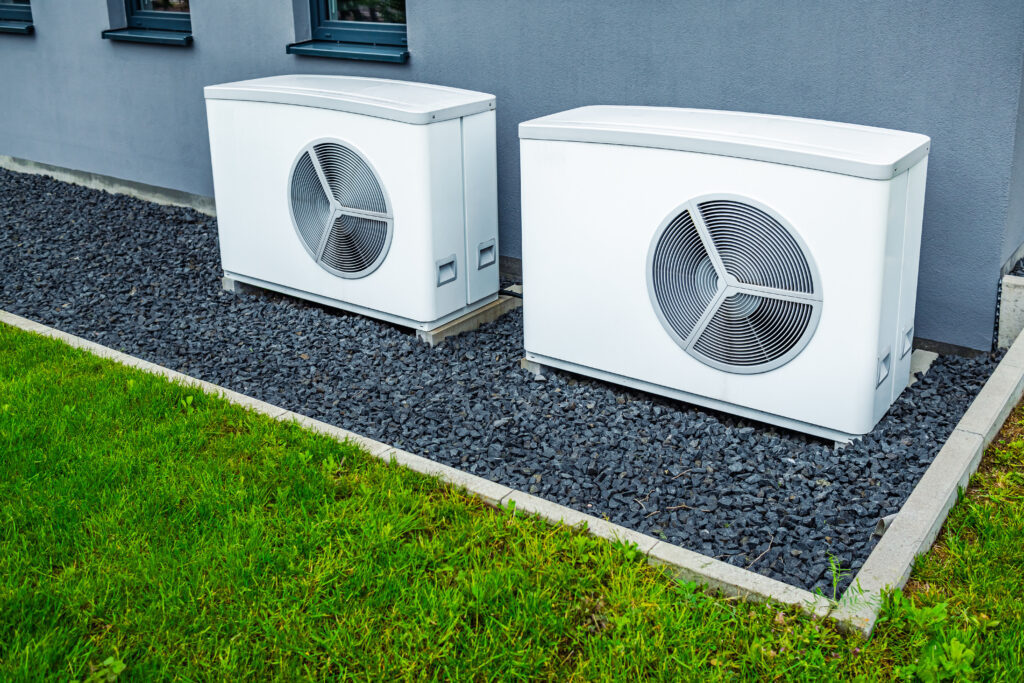When it comes to choosing a new heat pump or air handler for your home, energy efficiency should be at the forefront of your decision-making process. An energy-efficient HVAC system delivers reliable comfort and reduces your home’s energy consumption and utility expenses. A crucial aspect of this decision process involves understanding the SEER (Seasonal Energy Efficiency Ratio) and EER (Energy Efficiency Ratio) ratings of potential heat pumps and air handlers, as these ratings provide insight into a unit’s efficiency and potential cost savings.
The SEER rating of a heat pump or air handler measures the cooling efficiency of the unit over a typical cooling season. A higher SEER rating indicates greater energy efficiency, which translates to lower utility costs and long-term savings. The EER rating, on the other hand, evaluates a unit’s cooling efficiency under specific conditions. By comparing this rating to the SEER rating, you can gain a more comprehensive understanding of a heat pump or air handler’s energy efficiency performance.
Understanding the importance of these efficiency ratings and knowing how to analyze them can significantly impact your HVAC system’s performance, comfort, and cost-saving capabilities. Explore the key differences between SEER and EER ratings and discuss how to choose the right energy-efficient heat pump or air handler for your home based on these ratings. Our professionals are committed to not only providing top-notch HVAC equipment but also helping our customers make informed decisions that enable them to experience optimal comfort and energy efficiency.
The Importance of SEER and EER Ratings
1. Energy Efficiency
The primary reason for understanding SEER and EER ratings is to gauge the energy efficiency of different heat pumps and air handlers. As energy-efficient HVAC units consume less electricity, they result in lower utility bills for homeowners, making these ratings crucial factors to consider when choosing a new HVAC system.
2. Environmental Impact
Investing in a heat pump or air handler with higher SEER and EER ratings also benefits the environment. By reducing energy consumption, energy-efficient HVAC systems help minimize carbon emissions and contribute to a greener planet.
3. Performance and Comfort
Higher SEER and EER ratings typically correlate with a higher quality of heating and cooling. This means systems with better ratings are more likely to provide dependable climate control and overall comfort for your home.
Understanding the SEER Rating
1. Calculation and Interpretation
The SEER rating is calculated by taking the total cooling output for a typical cooling season (measured in BTUs) and dividing it by the unit’s energy consumption (measured in watt-hours). A higher SEER rating indicates better energy efficiency, with the minimum recommendation currently set at 13 SEER for central air conditioners and heat pumps. If you live in a region with hot, humid summers, investing in a unit with a higher SEER rating will lead to more significant energy and cost savings.
2. Choosing the Right SEER Rating
When selecting a heat pump or air handler with the appropriate SEER rating for your home, consider factors like climate, usage patterns, and energy-efficiency goals. Our professionals can help guide you through this process to find the most suitable SEER-rated system for your needs.
Understanding the EER Rating
1. Calculation and Interpretation
The EER rating is determined by dividing the cooling output of a unit (measured in BTUs) by its energy consumption (measured in watt-hours) under specific conditions. Like the SEER rating, a higher EER rating implies superior energy efficiency.
2. Choosing the Right EER Rating
When evaluating EER ratings, consider your local climate and the typical cooling demands of your home. EER ratings are particularly useful for homeowners in regions with consistently high temperatures, as they provide insight into the unit’s efficiency under extreme conditions.
Comparing SEER and EER Ratings
1. The Relationship Between Ratings
While both SEER and EER ratings measure the energy efficiency of heat pumps and air handlers, their calculation methods differ. SEER ratings are based on a range of temperatures and conditions experienced over a cooling season, while EER ratings focus on a specific temperature and humidity condition. To make the most informed decision, consider both ratings when selecting a new HVAC system.
2. Balancing Cost and Efficiency
Higher-rated HVAC units often come with increased upfront costs but offer long-term savings through reduced energy bills. When deciding between SEER and EER ratings, take into account the initial investment and the potential for savings over the system’s life. Our professionals can help identify the most cost-effective option based on your specific needs.
Implementing Energy-Efficient Strategies
1. Proper Installation
No matter how efficient a heat pump or air handler is, its performance will suffer without proper installation. To maximize your new HVAC system’s SEER and EER ratings, rely on expert technicians for professional installation services.
2. Routine Maintenance
Regular maintenance is crucial for maintaining optimal energy efficiency. Schedule periodic inspections with professionals to ensure your HVAC system operates at peak performance.
3. Consider Additional Energy-Saving Measures
While purchasing an HVAC unit with excellent SEER and EER ratings is a great start, consider implementing other energy-saving strategies, such as sealing air leaks, adding insulation, and using smart thermostats.
Making the Most of SEER and EER Ratings for a Comfortable and Energy-Efficient Home
Understanding SEER and EER ratings is essential to selecting an energy-efficient heat pump or air handler that fits your home’s needs, providing optimal comfort levels while minimizing energy consumption. By working with professionals, you can make informed decisions regarding your HVAC system’s efficiency and design, ensuring you enjoy all the comfort and energy-saving advantages your new system offers.
At iHeart Amana, we supply a wide range of heat pumps and air handlers with exceptional energy efficiency ratings, ensuring that our customers receive the desired comfort and energy-saving benefits. Don’t wait to start experiencing the benefits of an energy-efficient HVAC system. Contact us today to schedule a consultation and we’ll evaluate your home’s specific needs and recommend the best system for you!


